
Dive boots are an essential piece of equipment for any diver. Not only do they provide protection and insulation for your feet, but they also offer essential grip and stability when walking on slippery surfaces or rocks. With a vast array of different styles, materials, and features available, it can be challenging to determine which dive boots are the best for your needs
But with so many options available, it can be tough to choose the best dive boots for your needs. That’s why we’ve scoured the market and tested countless pairs of boots to bring you the ultimate guide to the best dive boots on the market. Whether you’re a beginner or a seasoned pro, our guide has something for everyone. So, strap on your fins and get ready to dive in with the best dive boots available!
All 10 Best Scuba Dive Boots
1. Cressi Adult Neoprene Diving Boots
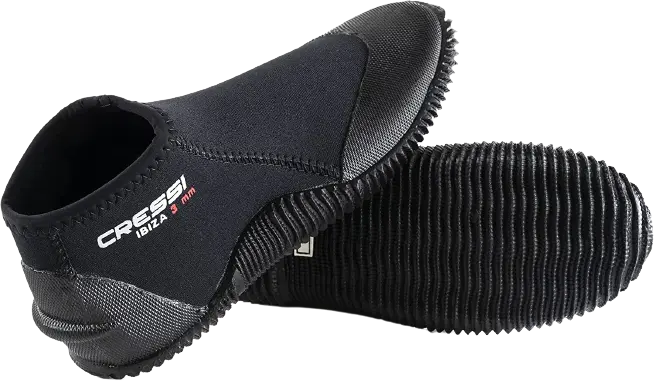
Cressi is a well-known brand in the diving community, and their Adult Neoprene Diving Boots are a testament to their commitment to quality and innovation. These boots are made of high-quality neoprene, which not only makes them extremely comfortable but also provides excellent thermal protection, keeping your feet warm in cold waters.
These boots are distinguished by their side zipper, which makes them easy to wear. This thick covering keeps feet warm despite the freezing temperatures of the water. As well as providing resistance against the hot sand, they are also water-repellent.
Specifications
Brand: Cressi
Weight: 1.1 Pounds
Material: Nylon, Neoprene, Rubber
Color: Black/Black
Style: Long 3mm
Sport Type: Outdoor Lifestyle
Our Overall Review
4.6
Reasons to buy:
Reason to Avoid:
Where to Buy?

4.6 / 05
Cressi Adult Neoprene Diving Boots
2. Neo Sport Premium Neoprene Men & Women Wetsuit Boots
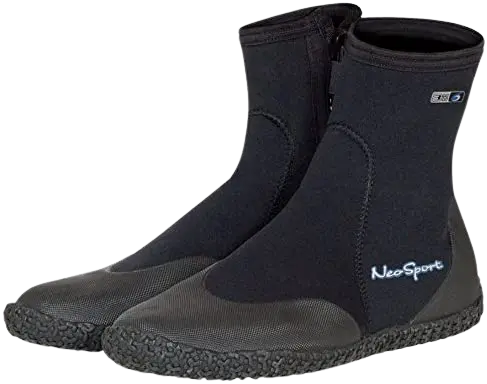
Looking for a comfortable and high-performance wetsuit boot to enhance your water sports experience? Look no further than the Neo Sport Premium Neoprene Men & Women Wetsuit Boots. Neo Sport Premium Neoprene Wetsuit Boot is the perfect choice for adventurers who go from warm to cold water temperatures throughout the year.
With its multi-purpose neoprene boot and puncture-resistant sole, it provides thermal protection against cold and heat. Additionally, the boot has a zip-up upper attached to a high traction sole, making it an excellent water shoe for boat decks, sandy beaches, and muddy areas.
Specifications
Brand: NeoSports
Weight: 1.45 Pounds
Material: Neoprene
Color: Black/Black
Style: Long 3mm
Sport Type: Diving
Our Overall Review
4.6
Reasons to buy:
Reason to Avoid:
Where to Buy?

4.6 / 05
Neo Sport Premium Neoprene Men Women’s Wetsuit Boots
3. Cressi Neoprene Adult Anti-Slip Sole Boots
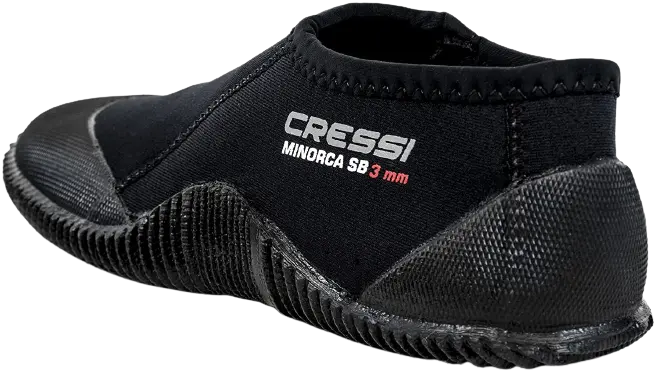
The Cressi Neoprene Adult Anti-Slip Sole Boots are a reliable and versatile option for any water enthusiast looking to have an enjoyable and safe experience. If you are looking for water boots that provide optimal performance, the Cressi Neoprene Adult Anti-Slip Sole Boots are an excellent choice. There is nothing better than the Cressi Minorca dive boots for warm water diving. In order to be suitable for tropical waters, they have a thickness of 3mm.
The Cressi Neoprene Adult Anti-Slip Sole Boots come with a reinforced heel and a sturdy zip closure, ensuring a snug fit around your feet. The soft neoprene material molds to the shape of your feet, providing excellent comfort and flexibility. The boots’ design includes a fin strap holder, making them compatible with open-heel fins.
Specifications
Brand: Cressi
Weight: 1.1 Pounds
Material: Nylon, Neoprene
Color: Black/Black
Style: Short 3mm
Sport Type: Scuba Diving, Snorkeling, Diving
Our Overall Review
4.6
Reasons to buy:
Reason to Avoid:
Where to Buy?

4.6 / 05
Cressi Neoprene Adult Anti-Slip Sole Boots
4. Mares Trilastic 5mm Sneaker Sole Dive Boot
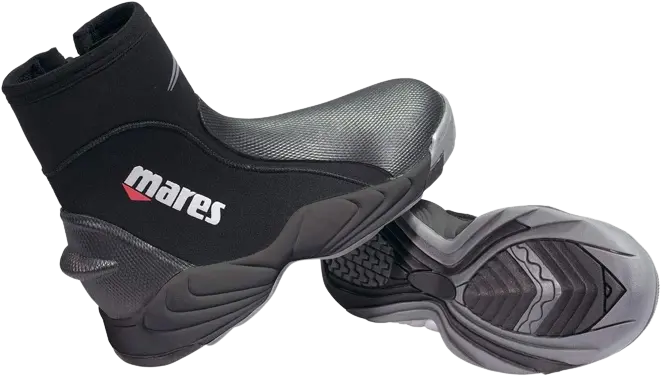
If you’re in the market for a high-quality pair of dive boots, the Mares Trilastic 5mm Sneaker Sole Dive Boot is an excellent option. With their superior design, durable construction, and impressive, these boots are a top choice for divers of all levels. They provide excellent traction, warmth, and comfort, making them a reliable and practical choice for any dive.
With a thickness of 5mm, it is ideal for warm and temperate waters. It’s one of the best dive boots if you want a boot with warmth, durability, and heavy protection. They contain a hard sole that not only insulates and keeps you warm but can also withstand more rugged conditions. Additionally, they are more durable than soft-soled dive boots as they offer fantastic protection against sharp rocks and rocky beaches.
Specifications
Brand: Mares
Weight: 1.7 Pounds
Material: 5mm Neoprene
Color: Black/Black
Type of Sole: Soft
Sport Type: Scuba Diving
Our Overall Review
4.5
Reasons to buy:
Reason to Avoid:
Where to Buy?

4.5 / 05
Mares Trilastic 5mm Sneaker Sole Dive Boot
5. O’Neill Heat 3mm Round Toe Booties
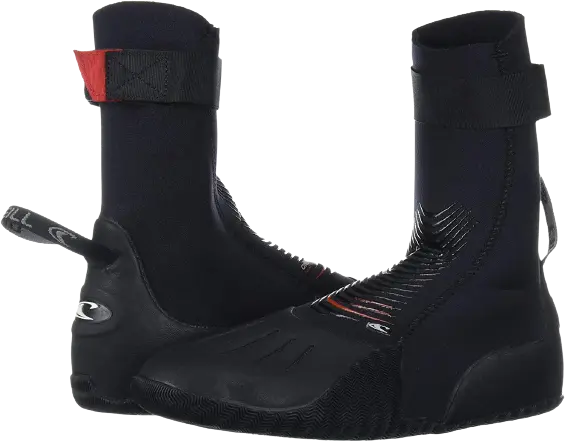
Are you looking for a pair of high-quality, durable, and comfortable neoprene boots for your next diving adventure? Look no further than the O’Neill Heat 3mm Round Toe Booties. These booties are designed to keep your feet warm and protected in the water. They are made from high-quality neoprene that is both flexible and durable, and the round-toe design ensures a comfortable fit for all foot shapes.
It is a great value for beginners and serious surfers alike to buy the O’Neill Heat boots. There is something about these boots that makes them a perfect choice for almost anyone due to the durable, yet soft sole and 100% super stretch neoprene. In addition to preventing flushing, a shin strap tightens boots to the leg. The boots have a heel pull tab that makes it easier to put them on.
Specifications
Brand: O’Neill
Weight: 5 Ounces
Material: Neoprene
Color: Black
Style: Shirt 3mm
Sport Type: Scuba Diving, Snorkeling, Diving
Our Overall Review
4.6
Reasons to buy:
Reason to Avoid:
Where to Buy?

4.6 / 05
O’Neill Heat 3mm Round Toe Booties
6. Cressi Tall Neoprene Boots for Snorkeling
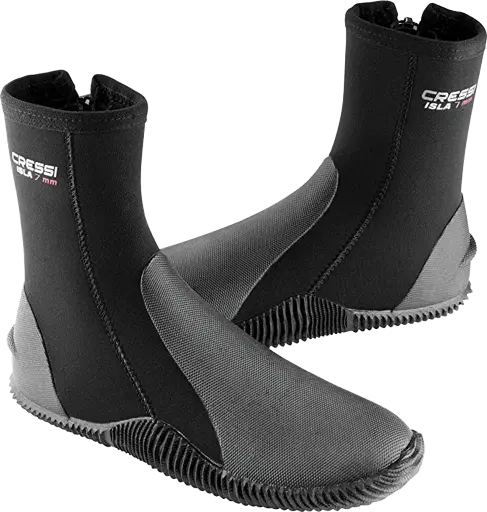
This pair of Cressi Isla dive boots is one of the best dive boots available on the market on a budget. The boots feature a tall design that covers the ankle and provides added protection and support. The rubber sole provides excellent traction and grip, making them ideal for walking on slippery surfaces, such as rocks or boat decks.
Soft double-layered neoprene provides a nice snug fit and ensures comfort in both 5mm and 7mm thicknesses. Their elasticity also makes them easy to put on and take off. One of the key benefits of the Cressi Tall Neoprene Boots is their comfortable fit.
Specifications
Brand: Cressi
Weight: 907 Grams
Material: Neoprene
Color: Black/Black
Style: Short 7mm
Sport Type: Scuba Diving
Our Overall Review
4.6
Reasons to buy:
Reason to Avoid:
Where to Buy?

4.6 / 05
Cressi Tall Neoprene Boots
7. Mares 2mm Neoprene Warm Water Non-Slip Rubber Sole Boot
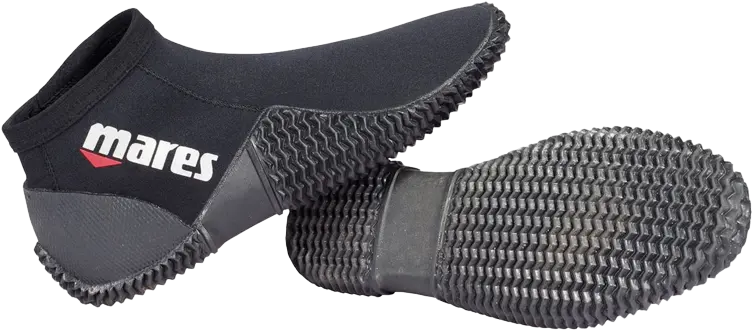
The Mares 2mm Low Top Medium Sole Equator Dive Boots are a popular option for scuba divers and snorkelers who want a lightweight and flexible boot that is easy to put on and take off. Moreover, Equators have rubber heels that prevent open heels from slipping as well as being cropped at the ankle.
The low-top design of these boots makes them easy to put on and take off, and they feature a durable YKK zipper that is corrosion-resistant and designed to last. The zipper is also covered by a neoprene flap, which helps to prevent water from seeping in and keeps your feet dry and warm. The medium sole on these boots provides good traction and grip, making them ideal for walking on slippery surfaces, such as rocks or boat decks.
Specifications
Brand: Mares
Weight: 2 Pounds
Material: Nylon
Color: Black
Style: Short 2mm
Sport Type: Snorkeling, Diving
Our Overall Review
4.6
Reasons to buy:
Reason to Avoid:
Where to Buy?

4.6 / 05
Mares 2mm Neoprene Warm Water Non-Slip Rubber Sole Boot
8. SEAC Pro HD 6mm Neoprene Wetsuit Boots
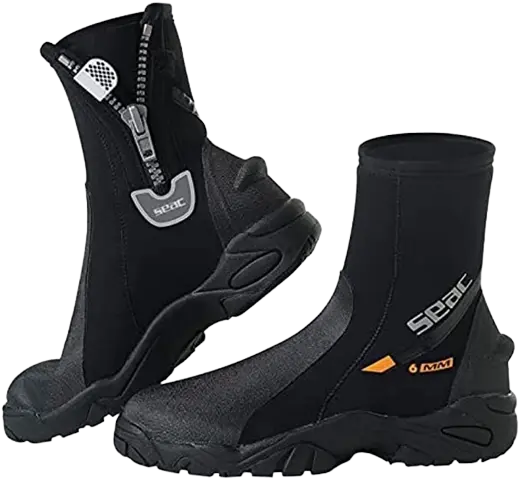
The SEAC Pro HD 6mm Neoprene Wetsuit Boots are a high-quality and reliable option for anyone looking for sturdy, well-insulated wetsuit boots for use in colder waters and challenging environments.
The upper edges of the boots are elastic seam taped to increase strength and durability. There are multiple sizes and colors of black boots available. One of the unique features of SEAC Pro HD 6mm Neoprene Wetsuit Boots is their double-lined neoprene material. This feature ensures that the boots are flexible and comfortable, allowing for easy movement of the feet, while also providing excellent insulation against cold water.
Specifications
Brand: SEAC
Weight: 6 Ibs
Material: Nylon
Color: Black
Style: Short 6mm
Sport Type: Scuba Diving, Snorkeling, Diving
Our Overall Review
4.6
Reasons to buy:
Reason to Avoid:
Where to Buy?

4.6 / 05
SEAC Pro HD 6mm
9. SARHLIO Neoprene Dive Boots
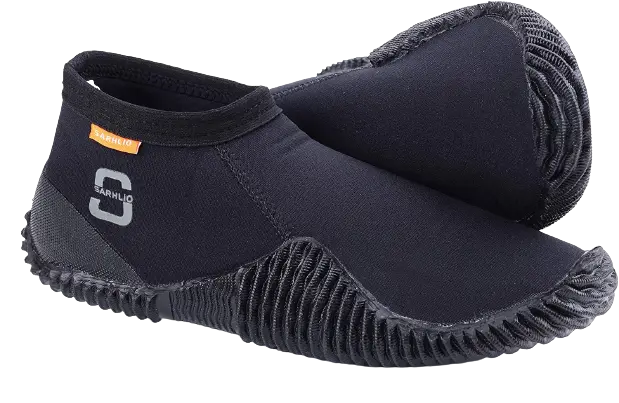
SARHLIO Neoprene Dive Boots are a type of footwear designed for diving and other water activities. It is also incredibly durable, making them a perfect choice for frequent divers. The premium quality materials used in their construction are resistant to wear and tear, ensuring that your boots will last for a long time.
One of the key features that sets SARHLIO Neoprene Dive Boots apart from other dive boots is their flexibility. These boots are highly elastic and can easily adapt to the shape of your feet, providing a comfortable and snug fit. This also means that they are easy to put on and take off, saving you time and effort during your dive.
Specifications
Brand: SAARHLIO
Weight: 0.90lbs
Material: Nylon
Color: Black
Style: Short 3mm
Sport Type: Scuba Diving
Our Overall Review
4.6
Reasons to buy:
Reason to Avoid:
Where to Buy?

4.6 / 05
SARHLIO Neoprene Dive Boots
10. XUKER Water Booties for Diving
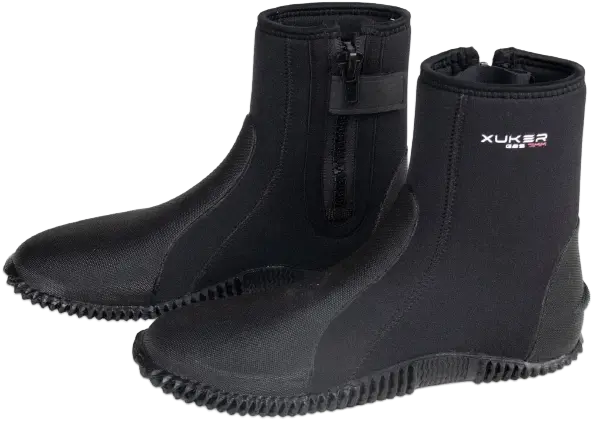
Xuker is one of the best-selling brands of diving water boots because they focus on meeting the needs of their customers. Do you also dislike accumulating water in your dive boots? It is recommended to get water boots made by XUKER since they minimize the amount of water that comes into the shoe, making the trip to the water more enjoyable.
The feet are exposed to a lot of friction and resistance while diving, snorkeling, and surfing. Thus, Xuker offers high-quality materials, so boots don’t wear out and provide support and protection. The tough sole of these boots is also anti-slip, so you won’t have to worry about embarrassing slips or falls.
Specifications
Brand: Xuker
Weight: 0.65 Kilograms
Material: Nylon, Neoprene
Color: Black
Style: Short 3mm
Sport Type: Water Sports
Our Overall Review
4.6
Reasons to buy:
Reason to Avoid:
Where to Buy?

4.6 / 05
XUKER Water Booties for Diving
Best Dive Boots – Buying Guide
It is quite different to buy regular shoes when you buy scuba diving boots. They are sports equipment, so there are specific design elements that are crucial for functionality, safety, and fit.
If you’re planning on going diving, having a good pair of dive boots is essential. Dive boots help protect your feet from rough or sharp surfaces, provide warmth and support, and can even improve your overall buoyancy in the water. Here’s a buying guide to help you choose the best dive boots for your needs:
- Material
Dive boots can be made from a variety of materials, including neoprene, synthetic fabrics, or a combination of both. Neoprene is a popular choice because it provides insulation and is flexible, while synthetic materials are often more durable and faster drying. Consider the water temperature and the type of diving you’ll be doing when choosing the material.
- Thickness
There are different thicknesses of neoprene in diving boots, ranging from 2mm to 7mm. A diving suit’s thickness should also be selected according to the same general principles.
You should match the thickness of your dive boots with that of your dive suit. Generally, 2 mm to 5 mm is suitable for warm water dives above 62°F, while 5 mm is recommended for cold water dives below 62°F.
- Sole
The sole of the dive boot is important for traction and stability. Look for boots with a thick, durable sole that provides a good grip on slippery surfaces. Some boots have a reinforced toe and heel for added protection, which can be helpful if you’ll be diving in rocky areas.
- Type of Sole
There are two types of soles: hard and soft. The hard sole on a shoe or boot (socks boots, shoes with socks) is stiffer than the soft sole on socks, shoes, or boots. There is some personal preference for using an open-heel fin with most models.
Hard soles might be preferred by cold water divers because of their additional insulation and buoyancy. In addition, shore divers and divers who scuba dive in sharp rocky formations might prefer the harder soles.
In boat diving, thin soles are preferred because they are easier to slip on and off. The lighter weight makes them ideal for scuba diving vacations.
- Boot Cut
In terms of design, there are two main types: low-cut and high-cut. In addition to being aesthetic, this cut serves to conserve body heat.
The low cut of thin warm water booties is due to this reason, while thicker cold water booties reach further up the calf. A diving wetsuit’s leg bottoms are wrapped around the high-cut dive boots, further preventing water from entering the suit.
It is common for high-cut boots to have zippers so that you can easily step in and out. It should be waterproof and have a zipper lock to prevent water from getting inside.
- Fit & Sizing
You should feel snug in your boots, just as you would in your diving wetsuit. In addition to being flexible in the water, you also want enough stretch to get a better grip on slippery rock formations.
The tighter fit might make it challenging to match your regular shoe size to your scuba diving boots. If a product runs large or small, check the reviews or better yet, refer to the brand’s sizing chart when available.
- Maintenance and Care
It is natural for the neoprene to wear out over time, but you can slow it down by regularly cleaning and deodorizing it. You should rinse and soak your scuba gear in fresh water and dry it away from direct sunlight, just like you would your diving wetsuits.
There are some manufacturers who provide a warranty on their soles and/or other parts. It is always a pleasure to receive such a service from a company.
Scuba Diving Boots: Why Should You Invest?
If you’re a scuba diver, investing in a good pair of scuba diving boots can provide several benefits:
Protection
Safety is always of utmost importance when it comes to diving, so you should never ignore it. With dive boots, you can focus on diving and not worry about injuring your feet all the time. Your feet can be protected from sharp objects such as shells, rocks, and corals by wearing booties.
A wreck dive would require deep-sea diving boots to prevent cuts and bruises on your feet. As well as protecting your feet from stings and bites, they can also prevent blisters. In slippery conditions, these booties will prevent accidents since they have traction.
Warmth
The opportunity to dive in different parts of the world is one of the wonderful things about diving. With this gear, you’ll keep your toes, ankles, and feet warm when diving in cold water. To ensure that your diving boots last as long as possible and continue to provide you with the protection and warmth that you need while diving, it’s important to take proper care of them.
This includes rinsing them with fresh water after each use, allowing them to dry completely before storing them and avoiding leaving them in direct sunlight for extended periods of time. Additionally, you may want to consider using a wetsuit shampoo to help keep the boots clean and smelling fresh.
Comfort
While protection is a significant consideration when choosing diving boots, comfort is equally important. A comfortable pair of diving boots can make a significant difference in your diving experience, allowing you to focus on enjoying the underwater world rather than worrying about your feet. Ill-fitting boots can cause blisters, chafing, and discomfort, making for a miserable dive.
It is best to wear dive boots to avoid this kind of discomfort. You will benefit from this gear as it will add a layer of protection between your skin and the strap. Additionally, you won’t have to worry about walking over scorching sand or abrasive rocks or shells when shore diving.
Techline Boots
The Techline Boots 5mm are extremely comfortable, adjustable, and designed for diving and other water sports. The Techline Boots are made of Yamamoto neoprene with a thickness of 5mm. The spur on the heel keeps the fin strips in place and prevents them from falling.
Grooves in the tread promote better grip on the ground. A non-slip sole prevents slips and falls. An anti-water circulation neoprene lock washer is included in Techline Boots. To protect the shoe pad from pressure or abrasion, rubber reinforcement has been included. The underwater world is a mesmerizing environment, and we enjoy introducing divers to it. You should embrace your passion for the aquatic world and dive responsibly.
Tips for Choosing Scuba Boots
The diver bootie call has been obeyed, but finding the right boots for you isn’t that easy. You can make the right choice by following these tips for choosing scuba boots.
- Remember the fins
In addition to your fins, you will need to buy your scuba boots. You should at least have your fins with you when you are booted up to ensure they fit correctly. A size larger than normal will most likely be needed for your fins.
- Size
The size of the scuba boots is similar to your shoe size, as you might expect. Ideally, they should fit like your shoes, snug but not pinching. They may fill with water if they are too large, resulting in cold feet. In addition to slowing blood circulation and making your feet cold, they will also rub and pain your feet. If you want to have a great dive, you don’t need distractions. Make sure you size up carefully so your dive does not become ruined.
- Length
Your scuba boots’ length contributes significantly to your warmth underwater. Your scuba tan will also look ridiculous – white feet, ankles, and thighs with brown calves.
If your booties are too short, you will have a gap between them and your wetsuit, leaving your leg/ankle exposed. In order to avoid your boots from filling up with water, choose boots that end above your ankle and can be secured under your wetsuit.
- Zips and seams
There are two types of scuba boots: zipless and zipped. It’s easier to get zipped, but zipless is cheaper. Ultimately, what you choose depends on your preferences. Make sure the zipper on your zippered booties has a backing to prevent cold water from entering. It is likewise important to make sure the seams are waterproof, so you can keep your feet warm as well. It is best to choose scuba boots with blind-stitched, glued, and liquid-taped seams.
- Scuba socks
Scuba socks are sometimes preferred instead of boots. Many people prefer them over boots with more flexibility because they’re easier to put on. However, they do not provide as much protection or grip as other types.
How to Protect Your Booties?
If you choose scuba boots and don’t care for them properly, they are likely to fail you. To ensure that your divers bootie calls last, you should maintain them properly. They may seem relatively insignificant when compared to your wetsuits or BCDs. The maintenance of scuba boots is pretty similar to the maintenance of wetsuits. A little Dettol, fresh water, air-drying, and love go into this process.
- Rinse your bootie
Fresh water should be used to rinse your scuba diving boots after diving for the day. The flexibility of neoprene can be reduced when it comes into contact with salt water. The smell of unrinsed neoprene is also unpleasant.
- Soak your bootie
Your scuba boots will benefit from a 15-minute soak when you get home. Alternatively, you can use a mild baby shampoo or a wetsuit shampoo. It doesn’t hurt to rinse your boots occasionally with a mixture of water and mild disinfectant.
- Inspect all booties for damage
Make sure your scuba boots are free of rips and tears before storing them for your next dive trip. They are easier to fix when they are small, but when you discover them just before diving, they are harder to fix.
- Bootie storage
Ensure that boots are stored under heavy gear, not crumpled and stuffed in a drawer. A crease in the boot can cause both damage and insulation loss. Avoid storing or drying your scuba boots in direct sunlight.
Frequently Asked Questions (FAQs)
Final Verdict
Choosing the best dive boots is crucial for any diver or water enthusiast as it provides protection, warmth, and stability in the water. Some of the top brands for dive boots include Scubapro, Cressi, Aqua Lung, Mares, and TUSA, among others.
These brands offer a range of boots that are suitable for different types of diving, as well as other water sports. As a result, investing in a good pair of dive boots is important to ensure comfort and safety during diving or other water activities. With the right pair of boots, you can enjoy the water without worrying about injuries or discomfort.

There are many individuals who are passionate about scuba diving, but there are only a few who are equally passionate about writing about scuba diving gear. One such person is Sarah, a scuba diver and writer who is based in a coastal town in Australia.
Shakira’s love for scuba diving started when she was a teenager. She was fascinated by the underwater world and the beauty of the marine life that thrived beneath the surface of the ocean. As she grew older, her interest in scuba diving only intensified. However, it was not until she started working in a dive shop that she began to appreciate the importance of scuba diving gear.
Shakira quickly realized that having the right scuba diving gear could make or break a diving experience. She also noticed that many divers did not fully understand the importance of choosing the right gear or how to use it properly. This realization sparked her interest in writing about scuba diving gear.
Shakira began to write articles for scuba diving magazines and blogs, sharing her knowledge and expertise on various types of scuba diving gear. She covered everything from wetsuits and fins to regulators and dive computers. Her articles were well-researched and informative, and they quickly gained a following among scuba diving enthusiasts.
What set Shakira apart from other scuba diving writers was her ability to explain complex gear concepts in a way that was easy for divers to understand. She had a talent for breaking down technical jargon into simple terms, and her writing was always clear and concise.
In addition to writing, Shakira continued to dive and test different types of scuba diving gear. She wanted to ensure that her articles were based on firsthand experience and that she could provide practical advice to divers.
Today, Shakira is considered one of the leading writers on scuba diving gear. Her articles are highly respected among the scuba diving community, and she continues to educate and inspire divers around the world. Her passion for scuba diving gear is infectious, and she has helped countless divers make informed decisions about the gear they use on their underwater adventures.
